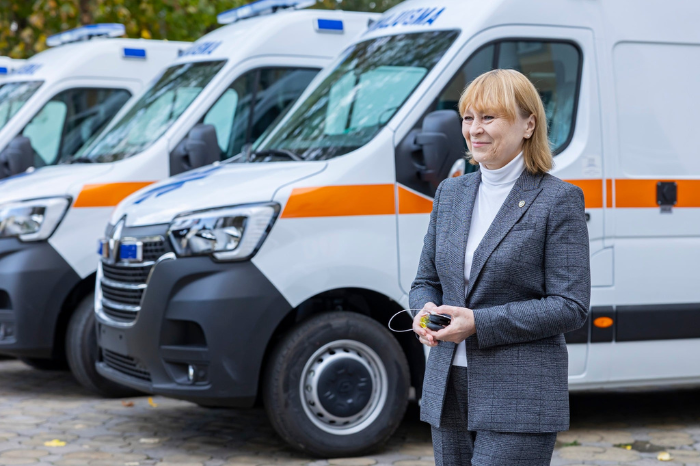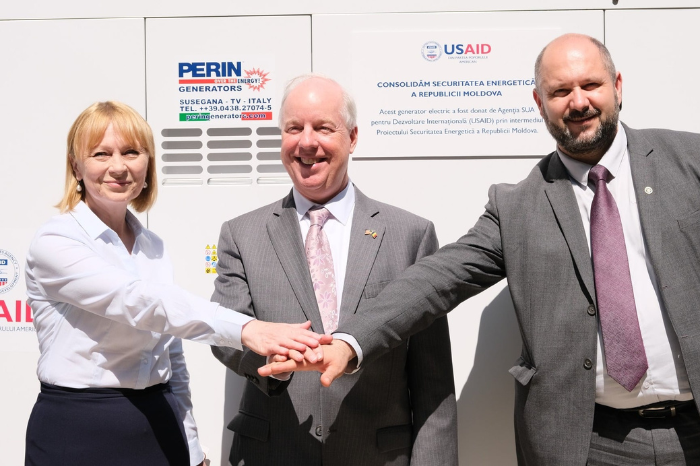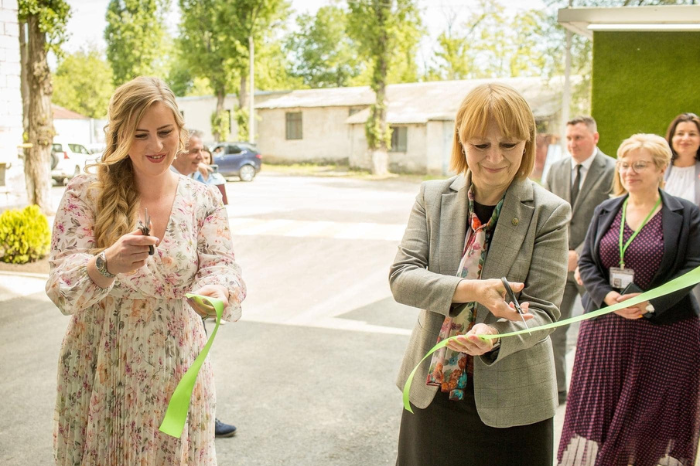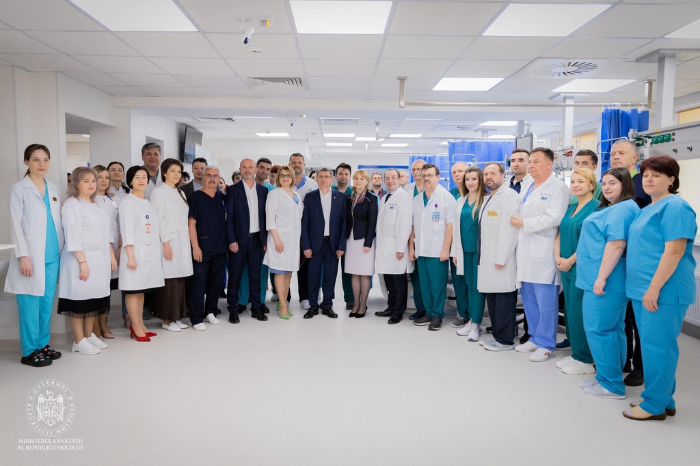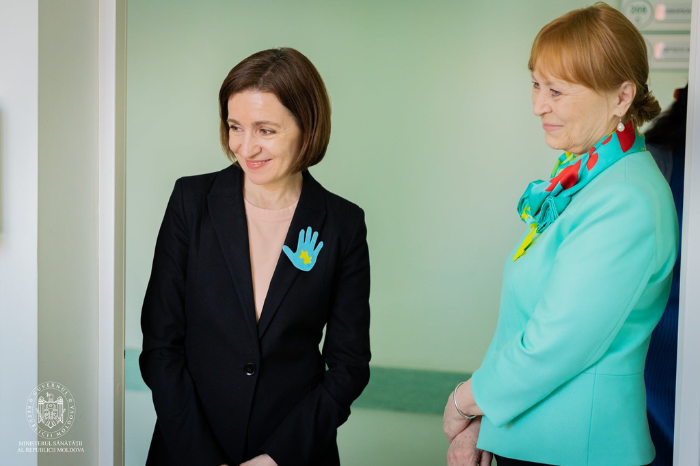EUROPEAN MOLDOVA // Health Minister says accession to EU means standards of high quality, efficiency, modernization for Moldova's health system
17:36 | 13.05.2024 Category: Interview, Event
*Moldova submitted the application on accession to the European Union on 3 March 2022
* Moldova got the status of country candidate for accession to the European Union on 23 June 2022
*The European Council on 14 December 2023 ruled to open the negotiations on accession to the European Union with Moldova
*Moldova is in full process of assessment of the degree of compliance of the national legislation with the European Union’s one, a first stage for the state’s accession to EU
*The authorities aim for Moldova to join the EU by 2030
Interview given with MOLDPRES State News Agency by Health Minister Ala Nemerenco
MOLDPRES: Mrs. Health Minister Ala Nemerenco, the native medical system presently faces different challenges – beginning with the lack of staff, corruption and ending with the lack of decent conditions for the treatment of patients. What actions does the Health Ministry undertake for the ‘’turning sound’’ of this sector?
Ala Nemerenco: The Health Ministry in the last two years and a half has undertaken significant efforts, in order to modernize and improve the health system from our country, so that it turns more efficient and is closer to the needs of the patients. Despite the multiple and simultaneous crises which we have faced – the pandemic crisis, energy crisis, refugees’ crisis – we managed to take safe steps for the systems’ ‘’transformation.’’
One of the priority fields is the one of the human resources from the medical system. We have made investments to increase the salaries, attract medical staff to rural regions for the providing of allowances, covering of more expenses dealing with for the transport to work and back, as well as living, facilitation of trainings abroad, elaboration of policies of continuous professional training and development, improvement of the working conditions, as well as the de-bureaucratization of processes and easing of the work of the medical staff through the improvement of the management of the digital systems.
At the same time, we facilitate the residents’ access to medicines and medical devices, through the extension of the list of compensated medicines and medical devices, as well as implementation of such projects as Compensated E-recipe or Drug Store in your village, in order to bring the pharmaceutical services closer to the citizens, to de-bureaucratize the processes and significantly reduce the obstacles in the access to treatment.
Also, from budgetary resources, as well as with the support of foreign partners, major investments are made in the modernization of the public medical and sanitary institutions from Moldova, as well as endowment with advanced medical equipment and devices. Thus, 11 sections of anesthesia and intensive therapy in a string of strategic hospitals, perinatal centres, emergency reception units, operation rooms, as well as other sections were capitally repaired. At the same time, the public health centres are under repair. Substations and points of pre-hospital medical assistance have been renovated and are under renovation. The public medical and sanitary institutions from the country benefited from endowments with last generation equipment, such as computerized tomographs, digital radiography apparatus, ultrasound apparatus, anesthesia apparatus, laparoscopes, colposcopes, defibrillators, monitors for vital functions, stretchers, operation tables, operation lamps, medical beds, endowments with ambulances, etc. While in 2021, only several hospitals had electric generator, presently, all medical institutions of the country have by 1-3 generators, in order to be able to ensure the continuity of work in case of emergencies. Also, on the pandemic period, the hospitals were using O2 cylinders for the needs of patients who were in major danger. At present, all hospitals of Moldova are provided with their own stations for producing oxygen.
Also, policies were promoted meant to improve the population’s access to medical services of high quality, among which: creation, at the nation level, of 13 centres for the patients hit by cerebral vascular accident, of the national network of colposcopy, made up of 12 rooms, introduction of the compulsory and free of charge hearing screening for new-born children in Moldova for the first time ever, the perinatal centres from all over the country were provided with 40 medical devices of neonatal hearing screening, etc.
Not in the least, we have carried out, in continuation, actions of informing and combating the corruption in the medical institutions, by actively cooperating with the National Anticorruption Centre and other institutions to this end. Thus, trainings are organized for the medical employees as concerns the measures of institutional and professional integrity, the programme titled, Promoter of integrity in health, was launched, the information campaign, Integrity for health, was carried out. Also, at each visit by ministry’s representatives to medical institutions, during meetings with medical staff, the transparency and integrity of the health system is promoted. These messages are conveyed also in the public area through mass communication means.
MOLDPRES: One of the major projects announced when you took over the position of minister was the construction of two regional hospitals in Balti and Cahul, in order to be able to provide medical assistance at modern standards to the residents from the northern region of the country. At what stage these projects are?
Ala Nemerenco: The Health Ministry plans the construction of two new regional hospitals in Cahul and Balti, modern, endowed with last generation equipment, where the highly-advanced medical services will be deconcentrated – neurosurgery, cardio-surgery, surgery, etc., so that the citizens have access to them closer to their place of residence, not only in institutions from Chisinau. So far, all procedures of accessing the loan have been fulfilled. Thus, as for the Balti regional hospital, the documentation is prepared for the procurement of the conceptual technical project and of the preliminary plan of the hospital. As far as the Cahul hospital is concerned, the feasibility study and the conceptual technical project are carried out by a company from the United Kingdom, which won the tender. The putting into operation of these hospitals will be made in the next several years.
MOLDPRES: The lack of qualified specialists is felt especially in districts. How do you want to persuade specialists to go to work in villages?
Ala Nemerenco: A priority of the Health Ministry is the investment in the human resource and their keeping in the system. Thus, starting from 1 October 2022, the monthly office salaries of the staff from the public medical and sanitary institutions involved in the mandatory health insurance system were increased by 10 per cent.
A new increase, by 15 per cent, was made starting from 1 October 2023 and namely the salary for the entire staff of the medical institutions. The supplement for the night duty was increased by 15 per cent as well. Over 48,000 employees of medical institutions benefited from this salary increase in all. The salaries for forensic physicians and legal experts working at the Forensic Medicine Centre grew by 35 per cent and the specific increase – by 15 per cent.
At the same time, in order to persuade young professionals to work in districts, we approved the payment of a one-off allowance worth 120,000 lei in the case of physicians and 96,000 lei in the case of the medium-sized staff, six months following the employment. In 2023, hundreds of physicians and medical assistants benefited from the allowance provided in one installment. In the rural regions, they benefit also from compensations for the electric and thermal energy.
Due to the creation of the best conditions of work through the modernization of the infrastructure of the public medical and sanitary institutions of Moldova, as well as the endowment with advanced equipment and medical devices, ever more young specialists choose to remain to work in district hospitals. While in 2018-2019, only about 18 per cent of the graduates who studied in the budget-financed sector went to work in the rural zones, at present, this figure reached about 44 per cent.
Also, the medical employees benefit from numerous trainings, exchanges of experience and study visits abroad; a larger number of young physicians were promoted to leadership offices, with significant possibilities of career growth.
MOLDPRES: Mrs. Minister, in Moldova, there are patients who have to purchase medicines from abroad, in order to be treated, as these medicines do not exist in our drug stores, or if they exist, they are more expensive. How to settle the problems on the market of medicines?
Ala Nemerenco: The Health Ministry, in cooperation with the Medicine and Medical Devices Agency (AMDM) and the National Health Insurances Company (CNAM), have carried out a string of actions with impact on the improvement of the residents’ access to the medicines needed:
- introduction of more efficient and more transparent mechanisms in the process of approval and registration of producer’s prices for medicines, new ways of management of the prices for medicines coming from the countries of Commonwealth of Independent States (CIS), China, India and other emerging countries;
- facilitating the access of medicines from the EU, the USA, Switzerland, Canada, Japan, Australia, the United Kingdom to the national market through the introduction of the accelerated procedure of their authorization during ten working days;
- diminution of the bureaucracy in the procedure of post-authorization of medicines;
- liberalization of the requirements for the packing, with the keeping of the prospectus in the Romanian language;
- implementation of the project, Drug store in your village, which envisages the providing of state subsidies meant for drug stores from the rural settlements, in order to enhance the access to the pharmaceutical services;
- allocation of solid budgets, in order to cover the costs for compensated medicines and medical devices;
- implementation, at the national level, of the information system, Compensated E-recipe, which ensures the quality of the medical act, shortening of the time and of the human errors at the prescription, efficient monitoring and use of compensated medicines and medical devices, better management of the resources in this sector.
Thus, the number of authorized medicines grew in Moldova, with a positive evolution recorded in 2023 against 2022 (+121 positions);
- the number of beneficiaries of compensated medicines in the first quarter of 2024 (485,440 people) increased by 15,496 people against the same period of the 2023 year;
- the compensated sum per one recipe of 166.32 lei (first quarter of 2024), increasing by 16.34 per cent against the first quarter of 2023;
- the average compensated sum per one beneficiary in the first quarter of 2024 was worth 587.83 lei, by 25.34 per cent more against the same period of 2023;
- the list of compensated medicines comprises 167 international common denominations of medicines, to which 1,210 commercial denominations correspond;
- the list of compensated medical devices comprises 6 denominations of medical devices, to which 59 models of medical devices correspond;
- CNAM for 2024 concluded 200 contracts with 1,510 pharmaceutical units, by 181 drug stores more against the 2023 year, of which +123 drug stores in the urban sector and 58 drug stores in the rural regions;
- four drug stores have been already opened within the project, Drug store in your village: Alexandreni village (Sangerei district), Cazanesti village (Telenesti district), Rasnova and Isnovat (Criuleni district). Following the tender organized by AMDM for the project, Drug store in your village, winners are nominated for the opening of 70 drug stores in various settlements of the country.
MOLDPRES: Moldova is in process of assessment of the adjusting of the national legislation to the European Union’s one. In the medical sector, how close or how far are we from the EU standards? In what fields are there the biggest discrepancies?
Ala Nemerenco: The European norms for the medical products and services are focused on the protection and improvement of the population’s health, access to the highly qualitative medical assistance, as well as the attenuation of the sources of danger of the human health.
In the last Enlargement Report, published by the European Commission in November 2023, the level of transposition of the EU legislation related to the Health Chapter and consumer’s protection (Chapter 28) was appreciated with the level 2 out of the 5 (from initial to advanced), established for the degree of adjusting to the EU legislation.
The norms and standards implemented in several fields, such as the blood transfusion and transplant of organs, regulations in the tobacco control sector, training programmes in medicine are, to a great extent, adjusted to the European requirements. The national legislation in the field of medicines and medical devices includes more aspects which meet the European norms, but need a string of adjustings, in order to reach the EU standards, through which their safety and efficiency is guaranteed. At the same time, there are sectors which are not subject of the national regulations and need the initiation of transposition, such as the regulation of the patients’ rights to receive medical cares in other EU countries and the procedures of reimbursement for these services.
The actions established for the Health Ministry in the National Plan on Moldova’s Accession to the European Union are meant to ensure the full harmonization of the national legal and institutional system with the EU’s legislation and institutional structure.
MOLDPRES: Mrs. Nemerenco, Moldova’s citizens are called to participate, in next autumn, in a referendum on the European integration of Moldova. Please, tell us how the native medical system will look, if our state joins the European Union?
Ala Nemerenco: The accession to the European Union means high standards of quality, efficiency and modernization. Some of the principal benefits of the accession to EU are high quality standards. Thus, the European Union has strict rules and high standards as regards the quality of medical services and the safety of patients. By the accession to EU, Moldova’s health system will have to align with these standards, which will lead to a significant improvement of the quality of medical cares provided to residents.
Another benefit is the access to European financing and resources. In its capacity EU member, Moldova will be able to quicker access important European funds meant for the construction, renovation and endowment of hospitals.
One more benefit would be the development of human resources, cooperation and exchange of experience. EU provides programmes on training, specialization and professional development for the medical staff, improving the competences and quality of the services provided. The accession to EU will facilitate the cooperation with other member states and the exchange of knowledge and good practices in the health field. Moldova will benefit from the experience and expertise of other European countries in the implementation of the health policies.
Access to innovating treatment and technologies – as European Union member, Moldova will have easier access to innovating medical treatment and technologies available in the member countries. This will allow quicker improving the new medical therapies and procedures in the country’s medical practice, thus improving the treatment and the results for patients.
The promotion of the health and prevention – through the integration into EU, Moldova will benefit from European public policies which promote the health and prevention of diseases. This will facilitate the implementation of the screening and vaccination programmes, as well as the promotion of the sound lifestyle among the residents.
We encourage all citizens to participate in the referendum for Moldova’s European integration and to thus contribute to the edification of a prosperous and safer future for everybody. We choose to be members of the European community, with high standards in health, education, and social and economic development. We should be the voice of the change and should vote for a European integration way of Moldova.
Mrs. Health Minister Ala Nemerenco, thank you for the interview!
Reporter: Alina Zară
